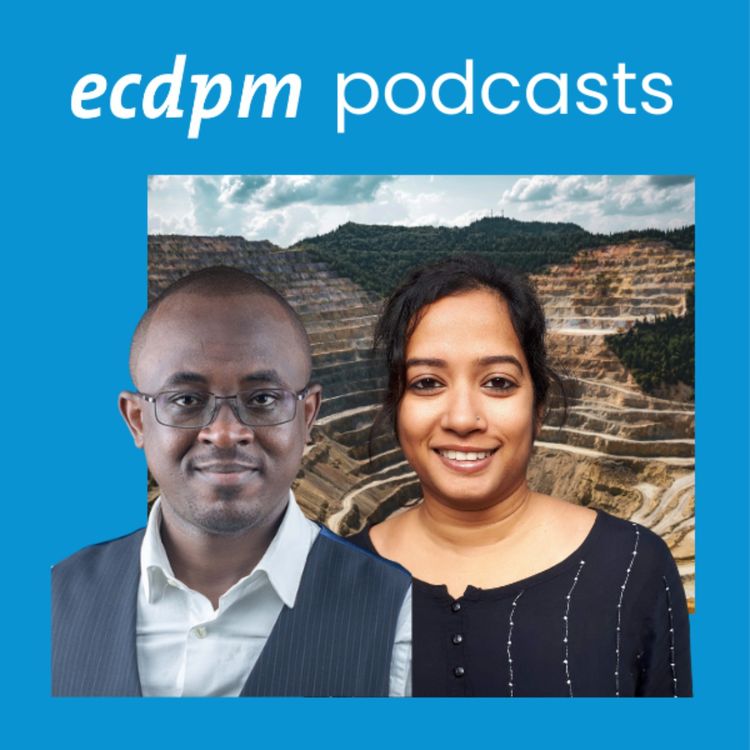Share

Europolis: The Global Europe Podcast by ECDPM
Critical Raw Materials: Geopolitical chess or tug-of-war for development?
•
Critical raw materials are vital for the EU's green transition and offer African countries a path to green industrialisation. Both however face policy dilemmas: Africa must efficiently use resources within, and share them between, countries, while the EU seeks to derisk from China and maintain industrial leadership. In this podcast, Poorva and Géraud discuss how these different moving parts fit together.
More episodes
View all episodes

9. Can Japan teach Europe how to balance AI development with democratic values?
32:08||Ep. 9In this episode of Europolis, Chloe Teevan and Gautam Kamat are joined by Hiroki Habuka, one of Japan's leading AI policy experts, to discuss Japan’s unique, agile approach to AI regulation and how it offers a modular alternative to the EU’s prescriptive model.
8. Is Ubuntu the secret to unlocking African tech sovereignty?
40:14||Ep. 8In this episode of Europolis, digital rights advocate and social entrepreneur Gbenga Sesan joins ECDPM's Sabine Muscat to explore the intersection of digital sovereignty, innovation, and human dignity. He argues that for Africa to truly thrive, it must transition from relying on aid to attracting investment, and that innovation cannot happen without respecting the rights of citizens.
7. The case for global solidarity
20:06||Ep. 7ECDPM director San Bilal speaks to Simon O'Connell, CEO of SNV, the Dutch development agency, as the organisation celebrates its 60th anniversary. The discussion explores how development actors can navigate a "race to the bottom" in aid financing and how reframing the narrative around solidarity isn't just old-fashioned idealism but a pragmatic necessity for a stable world.
6. The AU-EU summit: Why the EU and Africa need each other in a fragmented world
42:31||Ep. 6In this episode of Europolis: the Global Europe podcast, Sophie Desmidt interviews Gustavo de Carvalho, senior researcher at SAIIA, on whether Europe and Africa can move beyond old donor-recipient dynamics to become the "adults in the room": stabilising forces that champion multilateralism as others step back.The conversation dives into how the partnership is shifting from aid to investment, the test for the EU’s Global Gateway, and why a true partnership means discussing global security, not just African conflicts.
5. AI in Africa: How are Africans using AI to accelerate development?
35:53||Ep. 5Chloe Teevan talks to Melody Musoni to explore how African innovators, researchers, and policymakers are shaping an AI ecosystem that responds to local realities. It highlights a shift from being consumers of technology to producers of homegrown solutions that are already transforming sectors like agriculture, health, and education.The discussion tackles the two sides of the AI debate in Africa: the pessimists, who worry about risks like data bias and the push from Big Tech for profit , and the optimists, who see a chance to tackle long-standing challenges. A central theme is that African countries are determined not to be left behind in the Fourth Industrial Revolution as they were in the past.
4. The EU needs African resources: Can it circumvent China?
33:52||Ep. 4The EU's green and digital ambitions depend on a stable supply of critical raw materials like lithium, cobalt and graphite. With growing concerns over value chain security and dependence on single countries like China, the EU has launched the Critical Raw Materials Act to build more resilient supply chains. But how can Europe build new partnerships, particularly in Africa, to achieve this?In this episode of Europolis, Chloe Teevan is joined by ECDPM's Poorva Karkare, senior policy analyst and expert on industrialisation and regional integration in Africa. They discuss the complexities of the EU's strategy, the role of partner countries in Africa, the much-discussed Lobito Corridor project, and the unavoidable influence of China. Poorva argues that true strategic autonomy for the EU may require innovative partnerships that leverage, rather than exclude, Chinese capabilities in African countries.
3. How the India Stack could revolutionise EU tech policy
40:53||Ep. 3Chloe Teevan and Gautam Kamath interview Rahul Matthan, one of India's leading technology lawyers, to explore India's innovative approach to tech regulation as a "third way" between the US's hands-off approach and Europe's prescriptive regulation. The episode highlights how this approach can unlock data abundance and address European concerns about sovereignty and competitiveness by influencing soft infrastructure and encouraging innovation within public rails. It also points to the potential for EU-India collaboration in creating interoperable frameworks and aligning objectives for digital ecosystems.
2. Can Europe build its digital infrastructure alone?
31:25||Ep. 2Chloe Teevan and Gautam Kamath interview Kai Zenner, Head of Office for MEP Axel Voss (European People's Party) and Senior Fellow at the Technical University of Munich. Kai was instrumental in the finalization of the AI Act and is a well-known commentator on European tech policy.A paradigm shift in transatlantic relations is forcing Europe to realize that it's "now or never" for significant changes in digital policy. Concerns about potential foreign control over critical data are pushing EU policymakers to act. Kai Zenner discusses his role in the EuroStack initiative: a grassroots movement uniting diverse individuals who feel Europe has become a "digital colony" dependent in critical areas. He describes the biggest hurdle is a lack of political leadership willing to make the necessary hard, strategic investment choices, rather than fragmented small investments.Gautam Kamath concludes by discussing Europe's strategic interdependencies, noting a divide between those advocating for purely European solutions and those recognizing Europe's need for openness and partnerships. Europe's historical strengths lie in being an open trading bloc and fostering consensus and needs to forge mutual partnerships with countries like Brazil (green technologies), Africa (AI), and India (skills and tech stack): moving beyond the "Brussels effect" and focusing on what Europe can learn from its global partners in a multipolar world.
1. What is digital sovereignty and how can Europe achieve it?
43:45||Ep. 1Chloe Teevan and Gautam Kamath interview Robin Berjon, French-Australian technologist, Deputy Director of the IPFS Foundation, and a major thinker on technology sovereignty and the tech stack.Robin Berjon explains that power in technology stems from operating infrastructures and that the current governance model for these infrastructural systems is largely autocratic, controlled by monopolies or duopolies. This autocratic power, which sets rules for users, can seep into society, potentially making society itself autocratic. The rules set by these digital monopolies can even become more important to businesses, like publishers, than state laws, leading to a loss of self-governance for collectives.He argues that the problem isn't a lack of innovation; it's the capture of architectural control points (e.g., how revenue flows, system defaults) by a tiny number of actors, leading to high power concentration. Breaking these monopolies requires intervention at the infrastructural level to liberate these control points, not just more innovation. Instead of trying to replicate Silicon Valley's model, which could lead to similar problems with European companies, the solution lies in breaking down digital problems into components and rebuilding them as governance infrastructure. The India Stack is presented as an interesting example of this approach: by allowing users on both sides of two-sided markets like ride-hailing to jointly control the network, it enables innovation and works better for both providers and consumers, unlike systems controlled by singular monopolies like Uber or Amazon.